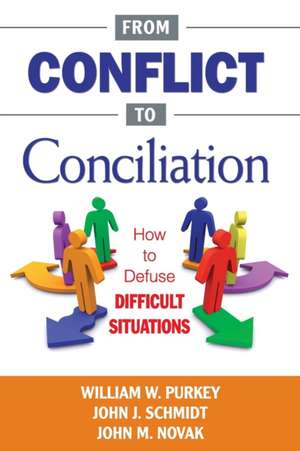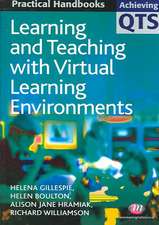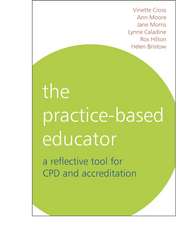From Conflict to Conciliation: How to Defuse Difficult Situations
Editat de William W. Purkey, John J. Schmidt, John M. Novaken Limba Engleză Paperback – 7 apr 2010
- Concern: identifying actionable concerns
- Confer: expressing concerns in nonthreatening ways
- Consult: reviewing and clarifying the situation collaboratively
- Confront: considering consequences and giving clear warnings
- Combat: taking sustained, logical action
- Conciliation: mending the wounds and restoring relationships
Focused on preserving relationships while resolving disagreements, From Conflict to Conciliation can be used in any situation or setting, from the classroom to the community.
Preț: 278.80 lei
Nou
Puncte Express: 418
Preț estimativ în valută:
53.35€ • 58.13$ • 44.95£
53.35€ • 58.13$ • 44.95£
Carte tipărită la comandă
Livrare economică 24 aprilie-08 mai
Preluare comenzi: 021 569.72.76
Specificații
ISBN-13: 9781412979863
ISBN-10: 1412979862
Pagini: 184
Ilustrații: Illustrations
Dimensiuni: 152 x 229 x 12 mm
Greutate: 0.32 kg
Ediția:1
Editura: SAGE Publications
Colecția Corwin
Locul publicării:Thousand Oaks, United States
ISBN-10: 1412979862
Pagini: 184
Ilustrații: Illustrations
Dimensiuni: 152 x 229 x 12 mm
Greutate: 0.32 kg
Ediția:1
Editura: SAGE Publications
Colecția Corwin
Locul publicării:Thousand Oaks, United States
Recenzii
"A very important and timely book that is well grounded in conflict theory and research. I especially appreciate that the strategies go beyond merely ending the conflict, but also speak to healing and seeking reconciliation. Purkey, Schmidt, and Novak have produced another winner to help educators create inviting and joyful schools."
"From the classroom to the boardroom, it’s inevitable for conflicts to happen. This book will introduce you to the six Cs, a logical process to tame those disagreements. The liberally sprinkled real-life anecdotes will keep you reading, and better yet, learning.”
“This book is a valuable, useful resource for all educators and administrators and is a significant contribution to the topic of conflict resolution. It provides a step-by-step process that begins not with action but with internal feelings and the confronter’s response to a concern or conflict and concludes with addressing the healing of the internal emotional needs of both the confronter and those being confronted.”
"In the democratic approach to conflict resolution presented in this book, the goal is to resolve the conflict in a way that builds relationships. The Six-C approach provides a framework within which people can work together to attack the problem, not each other. By ending each conflict with conciliation, the people who use this approach in schools, hospitals, homes, and businesses will be able to do much more than resolve conflict—they can build each other up so future conflicts will be easier to resolve."
"Effective problem-solving skills are essential in the home, school, community, and in business and industry. The Six-C Process provides sequential steps and practical procedures to cultivate respect and solve problems."
“When your office door bursts open with an angry parent, teacher, or child, combat has already commenced and it is too late to regret your decision to not purchase this book beforehand.”
"The 6 Cs provide strategies to support us to move from conflict to conciliation in a most effective and economical manner. They also open up a new way of thinking to turn potential conflicts into possible means for mutual growth through this meaningful and inviting process."
"I highly recommend this book to anyone who works with today's youth. It will decrease teasing and bullying issues. I have used the six Cs for several years at my school and it works!"
"A practical guide to help educators and others who deal with the public determine how to choose your battles and deal with them at the least aggressive level using a logical and respectful process."
"An ethically sensitive and compelling perspective on dealing with inevitable life conflicts in ways that are positive, beneficial, and self- and others-enhancing."
"This book contains a wealth of strategies to use on a daily basis for interacting effectively with others. Educators will enjoy teaching these valuable life skills to their students and seeing the positive results."
“Every teacher should study the Six-C Process. The authors provide a positive, constructive, and hands-on approach to dealing with challenging situations. What a great process for educators to use!”
"A truly brilliant guide to help the reader assess the inevitable conflicts of daily life! Through a step-by-step process, the authors share pointed questions that can prevent conflicts of life and work from becoming overwhelming. Readers will find this useful for building personal relationships as well as professional ones."
“The 6-C process adds a unique dimension to conflict resolution. My experience with the 6 Cs integrated in the Grow With Guidance System produced powerful and empowering results. Thank you for this dynamic book!”
"The authors recommend useful strategies for improving the human condition using the least amount of energy and time. This is a good read for employees and managers who work with the diverse individuals in today's fast-paced and competitive workplace."
"From the classroom to the boardroom, it’s inevitable for conflicts to happen. This book will introduce you to the six Cs, a logical process to tame those disagreements. The liberally sprinkled real-life anecdotes will keep you reading, and better yet, learning.”
“This book is a valuable, useful resource for all educators and administrators and is a significant contribution to the topic of conflict resolution. It provides a step-by-step process that begins not with action but with internal feelings and the confronter’s response to a concern or conflict and concludes with addressing the healing of the internal emotional needs of both the confronter and those being confronted.”
"In the democratic approach to conflict resolution presented in this book, the goal is to resolve the conflict in a way that builds relationships. The Six-C approach provides a framework within which people can work together to attack the problem, not each other. By ending each conflict with conciliation, the people who use this approach in schools, hospitals, homes, and businesses will be able to do much more than resolve conflict—they can build each other up so future conflicts will be easier to resolve."
"Effective problem-solving skills are essential in the home, school, community, and in business and industry. The Six-C Process provides sequential steps and practical procedures to cultivate respect and solve problems."
“When your office door bursts open with an angry parent, teacher, or child, combat has already commenced and it is too late to regret your decision to not purchase this book beforehand.”
"The 6 Cs provide strategies to support us to move from conflict to conciliation in a most effective and economical manner. They also open up a new way of thinking to turn potential conflicts into possible means for mutual growth through this meaningful and inviting process."
"I highly recommend this book to anyone who works with today's youth. It will decrease teasing and bullying issues. I have used the six Cs for several years at my school and it works!"
"A practical guide to help educators and others who deal with the public determine how to choose your battles and deal with them at the least aggressive level using a logical and respectful process."
"An ethically sensitive and compelling perspective on dealing with inevitable life conflicts in ways that are positive, beneficial, and self- and others-enhancing."
"This book contains a wealth of strategies to use on a daily basis for interacting effectively with others. Educators will enjoy teaching these valuable life skills to their students and seeing the positive results."
“Every teacher should study the Six-C Process. The authors provide a positive, constructive, and hands-on approach to dealing with challenging situations. What a great process for educators to use!”
"A truly brilliant guide to help the reader assess the inevitable conflicts of daily life! Through a step-by-step process, the authors share pointed questions that can prevent conflicts of life and work from becoming overwhelming. Readers will find this useful for building personal relationships as well as professional ones."
“The 6-C process adds a unique dimension to conflict resolution. My experience with the 6 Cs integrated in the Grow With Guidance System produced powerful and empowering results. Thank you for this dynamic book!”
"The authors recommend useful strategies for improving the human condition using the least amount of energy and time. This is a good read for employees and managers who work with the diverse individuals in today's fast-paced and competitive workplace."
Cuprins
Preface
Acknowledgments
About the Authors
1. Conflict and the Six-C Process
Introduction
Research and Anecdotal Support
What Is Unique About This Book?
The Six-C Process
The Conciliation Capstone
Saving Time and Energy
Conflict Is Inevitable
The Use and Misuse of Power
The Democratic Ideal
Why Everyone Matters
The Perceptual Tradition
When Viewpoints Conflict
Acceptance Versus Agreement
Summary
Major Themes
2. Concern
Latent Concerns
Actionable Concerns
What Is a Concern?
What Are Moral and Ethical Concerns?
What Are Your Concerns?
Potential Concerns at School
Potential Concerns at Home
Potential Concerns in the Community
Summary
Major Themes
3. Confer
Setting the Stage for Conferring
Can You Express Your Concern Clearly?
Can You Look Beyond the Immediate Concern?
Is There Room for Compromise or Re-Conceptualization?
The Value of Seeking Commitment
Helpful Communication Skills
The 3+++wish? Formula
Practicing the 3+++wish? Formula
Handling Challenges
Summary
Major Themes
4. Consult
Considering the Situation
What Is a Consulting Relationship?
Using a Triangular Structure
Involving Others in a Consultation
Sequential Steps for Consulting
Practicing the Consulting Sequence
Summary
Major Themes
5. Confront
Questions to Ask Yourself
Difference Between Conflict and Confrontation
Understanding Confrontation
Adapting Constructive Confrontation
Applying Practical Tips
Major Themes
6. Combat
Constraints on Combat
The Use of Power
Increasing Chances for a Desirable Outcome
Taking a Stand
Civilized Dissent
Summary
Major Themes
7. Conciliation and Beyond
Conciliation After Combat
Conciliation as a Reflective Process
Beyond Conciliation
Summary
Major Themes
References and Resources
Index
Acknowledgments
About the Authors
1. Conflict and the Six-C Process
Introduction
Research and Anecdotal Support
What Is Unique About This Book?
The Six-C Process
The Conciliation Capstone
Saving Time and Energy
Conflict Is Inevitable
The Use and Misuse of Power
The Democratic Ideal
Why Everyone Matters
The Perceptual Tradition
When Viewpoints Conflict
Acceptance Versus Agreement
Summary
Major Themes
2. Concern
Latent Concerns
Actionable Concerns
What Is a Concern?
What Are Moral and Ethical Concerns?
What Are Your Concerns?
Potential Concerns at School
Potential Concerns at Home
Potential Concerns in the Community
Summary
Major Themes
3. Confer
Setting the Stage for Conferring
Can You Express Your Concern Clearly?
Can You Look Beyond the Immediate Concern?
Is There Room for Compromise or Re-Conceptualization?
The Value of Seeking Commitment
Helpful Communication Skills
The 3+++wish? Formula
Practicing the 3+++wish? Formula
Handling Challenges
Summary
Major Themes
4. Consult
Considering the Situation
What Is a Consulting Relationship?
Using a Triangular Structure
Involving Others in a Consultation
Sequential Steps for Consulting
Practicing the Consulting Sequence
Summary
Major Themes
5. Confront
Questions to Ask Yourself
Difference Between Conflict and Confrontation
Understanding Confrontation
Adapting Constructive Confrontation
Applying Practical Tips
Major Themes
6. Combat
Constraints on Combat
The Use of Power
Increasing Chances for a Desirable Outcome
Taking a Stand
Civilized Dissent
Summary
Major Themes
7. Conciliation and Beyond
Conciliation After Combat
Conciliation as a Reflective Process
Beyond Conciliation
Summary
Major Themes
References and Resources
Index
Descriere
The Six-C process allows educators to take progressively more assertive steps as needed to resolve a conflict, using the least amount of time and energy while preserving relationships.













